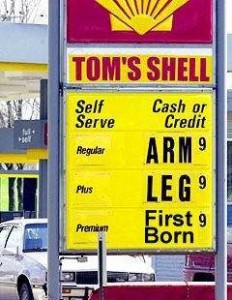Keep Gas Prices High
By Cassie
I know, I know. That sounds like blasphemy, but it really can bring about solutions not the least of which would be ending our dependence on oil and therefore foreign powers (eg: war!). How do high gas prices work to decrease our dependence on oil and what other benefits can be derived? I can think of at least three ways.
1) High gas prices drive up the price of everything that is shipped in, and that is a good thing because we think before we ship. Why are we shipping in water for instance (in the form of bottles of water, watermelons, pop, oranges, beer and so many other things)? We may actually go back to a simpler and more sustainable way of life if we shipped/trucked fewer things in/out. The things that are shipped in should be things we can’t produce locally, and only then, it should be a rare treat to see oranges and bananas in Colorado (or fresh cranberries in Puerto Rico). If we are going to ship things, they should be dry goods like spices or coffee. People could learn how to make bread from local mills (for example) and buy locally produced furniture and toys instead of shopping at Wal-Mart where probably 70% of its products come from China (that’s a long way and a lot of fuel to get here).
The phrase, “think global, live local” sums it up. When we live, eat and buy in and from our local area, we not only support our local area (farmers, businesses, community), but also help to stop the exploitation of other areas across the globe (think: sweatshops, child labor, slavory). I am trying to turn into a locavore. Yes, a little loca too 🙂
2) High gas prices also make you think about your travel. That is also a good thing. Maybe people will use scooters more or -gasp- bicycles and FEET! This can help us combat our obesity epidemic (if you haven’t seen the CDC report, Colorado is the last hold-out, but still tremendous high level of overweight/obesity http://www.cdc.gov/nccdphp/dnpa/obesity/trend/maps/) Maybe we will build our cities so that they are connected and people want to go (walking/biking) to a flourishing downtown. Maybe SUVs won’t be the big monster gas-guzzling bullies that they are anymore as people downsize their vehicles.
3) High gas prices also make you think about our energy infrastructure and what we can do about it. We have had electric car technology (and electric trolleys) for nearly a century. We have also had CAFE standards that the auto makers conveniently forget about and pass the fine costs on to the consumer. We have mass-transit solutions (although this might require a change in the individualistic mind-set). We have had solar energy capabilities including being able to beam down energy (no it’s not science fiction) from space solar power.
When we start thinking about this, we start to realize the amount of control the oil companies wield over America. Exxon-Mobil alone makes more money (profits) in a quarter than the annual GDP of many developing nations –combined! No wonder we have been so slow to change our energy policies. Oh, that and we have an oil man in the highest position of the land. Hmmmm.
Listen, I don’t like paying more for energy than anyone else, and in fact, I am known for being rather frugal, but if this is the only way to get out from under Big Oil’s thumb, keep on a-rising. It’s certainly given me more incentive to ride my bike! And no, giving us a “tax holiday” (average in US for state and federal is only 47 cents/gallon) or drilling up the wildlife reserves is NOT the answer. Actually, a gas tax could help. We could tax gas until it is obsolete and give the money back to the people in the form of incentives for solar energy on their houses (to power their own electric cars!), or for free bicycle programs, help in creating active community environments, tax rebates for hybrid and other energy solutions, business incentives for work from home programs and not just use the taxes to build bigger roads for bigger cars with bigger seats.
Here’s an article about harvesting the sun’s power from space:
¼/p>




I want to drive fast electric cars. I’ve been fixing and using electric cars since I was a little kid (R/C Cars) so I have a pretty good understanding of how they work. Very few moving parts, motors never break and hardly ever wear out. The batteries are the weakspot, but when they are fully charged they are really really fast.
Electric For The Win (FTW)!
I wish I only had to pay 4 dollars and gallon for gas. Screw nature let the drilling begin.
Damon, you need a scooter! Also, another “wrong” answer in addition to drilling and removing taxes is corn kernal ethanol. It drives up food costs, uses tons of petroleum-derived fertilizers/pesticides and of course water. By-product (cellulosic ethanol) and bio-diesel could be part of the solution though. Oh and I am still waiting on your pictures to post here.
Scooters, cars, electric cars, hydrogen cars, hybrids, etc. all use some type of harmful materials that are released into our environment either directly or indirectly. Even owning a bike has consumption of some environmentally unfriendly product (plastic, metal, chemicals, etc.).
Electricity isn’t “clean”. Its generated from all kinds of harmful pollutants (coal, chemical leeching from landfills, etc.).
People don’t need to run out and buy new cars that run off electricity, or buy a scooter. They just need to make better decisions with the resources they have. Maintain their cars, don’t run the AC all the time, turn off your lights, don’t take as many showers, use lower temp settings on washers, dry your clothing outside if its nice out, grow veggies instead of lawns, etc.
People are upset about the price of gas because they have been greedy in their consumption of gas. If they really looked at their driving habits they could find ways to reduce their dependence on gas and have a lower gas bill.
TNK (Is this Torrie?) I agree. We should limit our consumption in general. All of the suggestions about turning off lights and AC, gardening are also great. And we do most of those. (Our thermostat is set at 79 degrees in summer and 65 in winter). People should not go out and buy a new car unless the difference is much greater (I would, for instance, switch from a Hummer to a Civic for instance, but Hummers shouldn’t have been used by civilians in the first place). And even then, I would only buy a used car because I am cheap and that reuses materials instead of creating more waste.
But people in general don’t keep their cars for longer than 5 years, so IF they are going to buy a new vehicle, a scooter or electric car would greatly decrease our dependence on oil. In one generation (20 years or so) we could have 80% of the vehicles on highways and roads operated with electricity or human power (muscles) with that kind of turnover.
In addition to having NO emissions, the amount of products used to create a 30 lb bicycle is much less than to make a car of about 1,500 to 2,000 lbs, or an SUV or truck of 2 tons (4,000 lbs) or more. In addition to saving all that material, bikes are easier to fix and people will keep them much longer than a car. Britton has gone through 2 (3 if you count the wreck) cars while keeping the same bicycle the whole time. Scooters would be in between. They use some gas, weigh more and use more materials than a bike, but not nearly as much as a car.
Electric vehicles may use many more materials than those two options, but their value is in not using gas. If we had incentives to power our houses with wind or solar power (incentives derived from a higher gas tax), then we wouldn’t have to burn coal or nuclear power to generate our energy (for our homes and cars). These (EVs) could be used as the vehicles for commuting or for longer distances than a bike or scooter.
Overall, high gas prices have got people thinking about these kinds of things and that in and of itself is useful. If people consume less in general, we could help turn these problems around. Awareness is the first step. “You become aware by accident, educated by choice.”
I was dinking around with a carbon output calculator and checked on our cars… here is what it spit out (I used a default of 12k miles per year, but some of us drive more and some less).
Cassie 10,207 lbs CO2
Britton 8,095 lbs CO2
Grandma 10,207 lbs CO2
Me 10,671 lbs CO2
Grandpa 14,673 lbs CO2
Tracker 10,207 lbs CO2
2001 Prius 5,726 lbs CO2
2001 Chevy Tahoe 16,769 lbs CO2
Here is the weird part..
My car today brand new puts out 11,179lbs, which is WORSE than the older model.
Brittons car today brand new puts out 7,826lbs, which is a tad lower but not much.
Dads truck puts out 13,810 lbs brand new, not much of an improvement.
Proof that car makers are not into making a smaller impact on the environment (the Prius new today puts out 4,995, which is less but not much). You would think that in the 9-10 years that have past these cars would have WAY better Co2 footprints.. but they don’t.
I drive between 50-100 miles a week. 2600-5200 a year. I average $40-60/month in gas costs. Last month it was $37. I bike an average of 50 miles a month to work (4 days a week/3 miles plus biking to aerobics). Of course, less in the winter though.
Keep gas prices high??? So what Exxon can continue its record profits?????
“Lifted by record crude prices, Exxon Mobil says its second-quarter earnings rose nearly 14 percent to $11.68 billion, the biggest quarterly profit ever by any U.S. corporation.”
Here we go!!!
This article sounds well, but how everything is related together?
Pingback: Our Oil Addiction | Fruitfulista